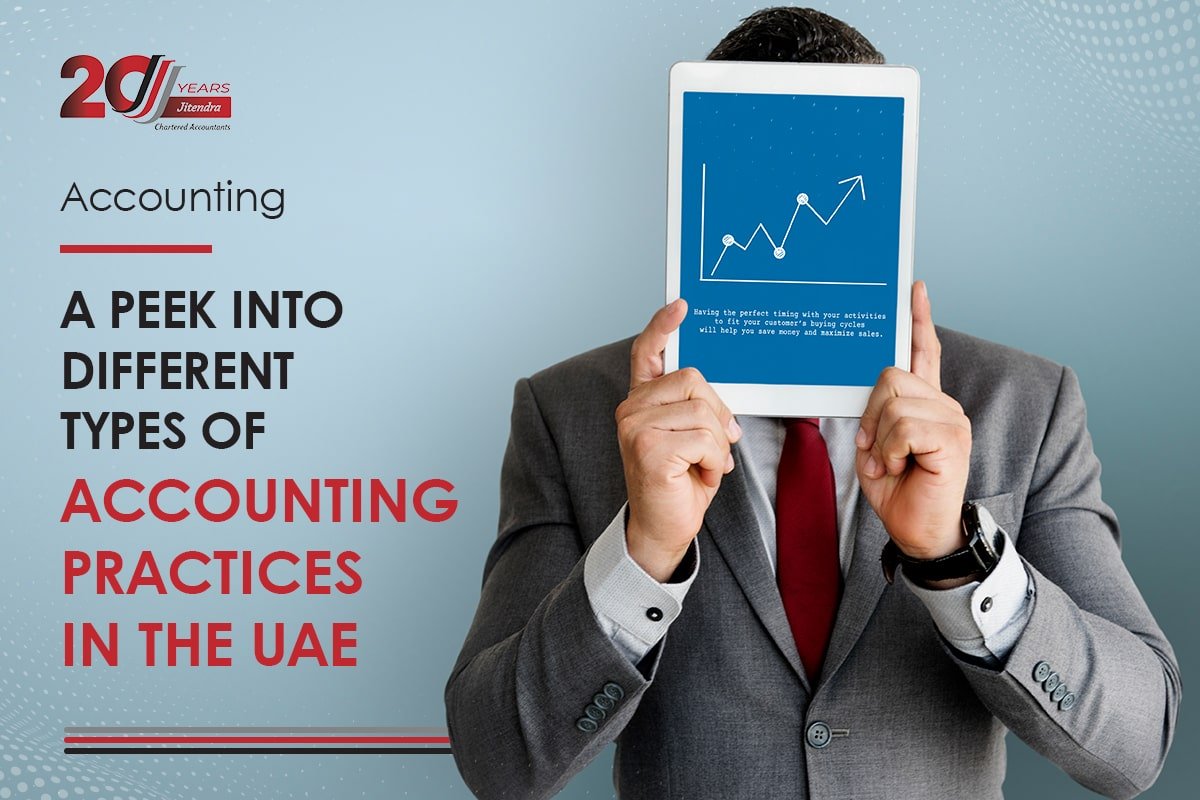
A Peek into Different Types of Accounting Practices in the UAE
If you are an entrepreneur running a small business in Dubai, you can’t afford to ignore the accounting function. Even if you build an in-house accounting team or outsource the process to accounting firms in Dubai, accounting is the life-saver of your business. Just like you see yourself in the mirror before stepping out of the house, similarly, you can’t ignore to see accounts if you are an entrepreneur, accountants show the mirror, Accounting informs you whether or not your company is making a profit and tells you key metrics such as cash flow, the value of your company’s assets and liabilities etc.
Accountants also tell you which areas of your company make money. Even though accounting is the most important function of a business, most small business entrepreneurs lack knowledge about it. Many of them are not willing to dedicate themselves to learn the nuances of the accounting process. Even if you have an accounting team within your organisation, you must learn the basics. This blog is an attempt to expose uninformed entrepreneurs to some basic aspects of accounting such as the different types of accounting in the UAE. Read ahead.
Financial Accounting
Financial accounting is the type of accounting process that everyone traditionally expects accountants to do: keeping track of a company’s financial transactions. Financial accountants produce financial reports using specific procedures by local or globally accepted accounting standards. These financial statements are created for shareholders or regulators.
Financial accountants track your company’s present financial position based on incomings, outgoings, liabilities and how money is moving through the organisation. The reports created by them are used externally by shareholders or potential investors. The financial statements of a company include the Balance Sheet, Profit and loss account, Cash flow statement, and the statement of change in equity. Each company may have its accounting process and software to maintain the accounts accurately. Accounting firms in Dubai can help the companies streamline and optimise their accounting process.
Management Accounting
Management accounting shares close similarities with financial accounting as the accountants track the company’s financial position and make reports. However, here, the reports are created to be used internally. Management accountants provide the financial information required by the managers to make informed business decisions.
Management accountants may use statistical tools and techniques to present data, which may help in decision making. However, it’s not just about stating figures. Management accounting is more about interpreting trends, making predictions and considering the non-financial, qualitative aspects of business too.
Tax Accounting
Tax accounting, as the name suggests, is about determining a company’s tax liabilities such as how much they should pay and why. In the UAE, the only form of tax is the Value Added Tax (VAT), which is levied at a meagre rate of 5%. A business in the UAE must register for VAT if its supplies and imports exceed the threshold of AED 375,000 per annum. Companies can opt for voluntary VAT registration in the UAE if their supplies and imports or purchases which are subject to VAT exceed AED 187,500 per annum.
Tax accountants also deal with interpreting complex and continually changing tax legislation. They track all transactions that may affect the amount of tax the company pays and also calculate how much is due. Tax accountants also help the companies keep the records as per the UAE VAT law. The UAE VAT law requires tax registrants to maintain the records for 5 years after the end of the tax period to which they relate.
Forensic Accounting
Forensic accountants can be called financial detectives as they analyse financial evidence to detect fraud and embezzlement. This method can be compared to forensic scientists using scientific methods to solve a crime, which justifies the comparison with detectives. If a case goes to court, forensic accountants translate the results of their analysis into terms that a judge or jury can understand. Big companies often have in-house forensic accounting teams to detect fraud, but SMEs can rely on accounting firms in Dubai for better results.
Cost Accounting
Cost accounting involves analysing all of the costs associated with producing an output such as input cost, fixed cost etc. this analysis helps the companies make better decisions about pricing, spending, and inventory. In this type of accounting, the accountants will first evaluate the costs and then compare them with the actual cost incurred by the company to analyse the variance thereof. Based on this, you can take remedial actions in a better way. Cost accounting is useful for management accounting as managers use cost accounting reports to make better business decisions. It also links to financial accounting because cost data is often required when compiling a balance sheet.
Outsource to the Best Accounting Firms in Dubai, UAE
Knowledge about different types of accounting practices will give more power to your journey as an entrepreneur in Dubai. However, an entrepreneur needs to focus more on his core competencies, which means accounting will get less consideration. No need to worry, the best accounting firms in Dubai such as Jitendra Chartered Accountants (JCA) will help you meet all types of accounting requirements.
JCA is one of the most experienced accounting & bookkeeping firms in Dubai with more than 20 years of exemplary service. Apart from providing accounting services in Dubai, JCA helps companies with VAT registration, VAT return filing, Anti-money Laundering (AML) compliance, Economic Substance Regulation (ESR), audit, and Ultimate Beneficial Ownership (UBO). If you prefer a holistic approach to accounting & bookkeeping, JCA might be the perfect pick for you.


